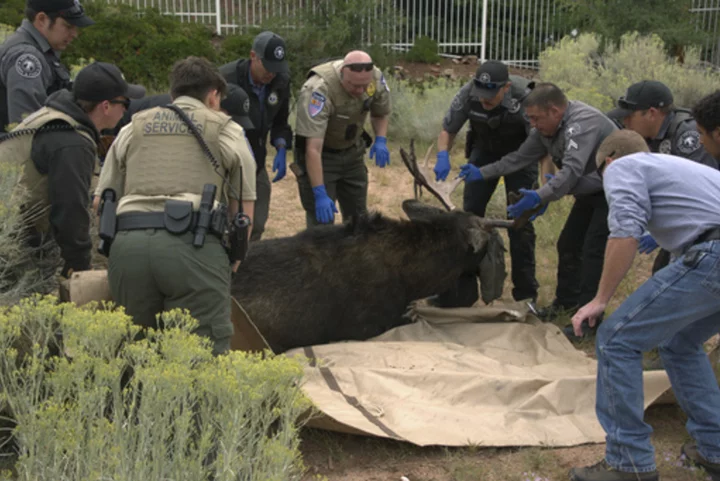A growing number of states are considering or have passed measures this legislative term to ban "foreign adversaries" and foreign entities -- specifically China -- from buying farmland.
Proponents of the laws, mostly Republicans but some Democrats as well, have frequently cited concerns about food security and the need to protect military bases and other sensitive installations. But the moves have stoked anxieties among some experts on US-Chinese relations, including those who see echoes of past discriminatory laws in the United States like the Chinese Exclusion Act.
Florida last month joined a list of at least seven other states -- including Virginia, North Dakota, Montana and Arkansas -- to pass variations of such bills this session, according to the National Agricultural Law Center (NALC), which is tracking the issue and conducts research on agricultural and food law. Similar measures are percolating in more than two dozen states and there's a bill in Congress that seeks to federalize the issue, the NALC said.
States have previously sought to limit foreign investment, said Micah Brown, a staff attorney at the NALC. What's new, Brown says, is that some lawmakers are taking aim at specific countries and their governments.
"2023 is really swinging for the fences here, with a majority of states having some kind of proposal, at least one proposal," Brown told CNN.
Of slightly more than 40 million acres of agricultural held by foreign investors in the United States, China held less than 1% of that land -- or 383,935 acres -- as of the end of 2021, according to a report from the US Department of Agriculture.
Fears about potential threats to sensitive sites
Florida's law, signed on May 8, prohibits most citizens from "foreign countries of concern" from purchasing land on or within 10 miles of any "military installation or critical infrastructure facility," including seaports, airports and power plants. It was signed alongside a different bill that bans internet applications like TikTok on Florida government devices, a similar area of focus for state politicians who have concerns about Chinese influence.
The foreign countries of concern that are named include China, Russia, Cuba, North Korea and Iran, along with agencies and governments operating on their behalf. In public remarks, governor and 2024 Republican presidential candidate Ron DeSantis repeatedly called out China.
"Today, Florida makes it very clear: We don't want the (Chinese Communist Party) in the Sunshine State. We want to maintain this as the 'Free State of Florida.' That's exactly what these bills are doing," DeSantis said at a bill signing in May.
Following the bill's passage, a group of Chinese citizens who live and work in Florida, along with a real estate company with primarily Chinese and Chinese-American clients, sued state officials, alleging the law would violate their equal protection and due process guarantees under the US Constitution. CNN has reached out to the governor's office for comment.
Virginia's legislation doesn't name China, though Republican Gov. Glenn Youngkin has specifically cited the CCP in advocating for the new law. Montana's applies to "foreign adversaries" as designated by the US Commerce Department, a list that includes China, Iran, North Korea and Russia.
Brown said the 2023 laws are part of a larger "political flashpoint" prompted out of concerns over Chinese companies attempting to build agricultural sites near military bases in North Dakota and Texas. States including Arkansas and Indiana already had laws restricting certain foreign investments prior to this year's legislative push.
In North Dakota, a US subsidiary of Chinese company Fufeng Group attempted to build a wet corn milling plant in Grand Forks that would have sat near an Air Force base there and thus pose what the Department of the Air Force called a "significant threat to national security."
The head of Fufeng's US operation denied the company has a "direct relationship" with the Chinese government in an interview with the Grand Forks Herald last year.
"We've got lots of places in North Dakota they could have built that plant without being a security risk, but instead, they chose to buy land right next to an Air Force base," North Dakota Republican state Rep. Lawrence Klemin, who co-sponsored the state's bill, told CNN. "We've got two Air Force bases in North Dakota, and we've got lots of places where we don't have them, so why didn't they do that?" Klemin's bill was signed in April.
Texas is also considering a bill that would bar "hostile nations including China," in the state from purchasing real property, like agricultural land, as Republican State. Sen. Lois Kolkhorst describes her legislation. The bill initially ignited controversy because it would have barred citizens of China and other adversarial countries from buying land in the state, though the bill was later amended to clarify that it would not apply to lawful permanent residents, US citizens and dual citizens and to include an exception for property considered "residence homestead."
Experts urge balance between national security and racial sensitivities
Several experts on US-China relations with whom CNN spoke warned against knee-jerk responses and called for lawmakers to act on evidence, not suspicion.
"I think there's a good reason to want to keep control of strategic interests in one's own country ... but these bills about farmland, these bills about just property in general, to me, it's transparent that they're rooted in racism and xenophobia again because we've seen this before. It really isn't the first time," said Nancy Qian, a professor of economics at Northwestern University's Kellogg School of Management who has conducted research on US exclusion laws.
Yan Bennett, the assistant director of the Paul and Marcia Wythes Center on Contemporary China at Princeton University, noted that US farmland is appealing for China because the country has food security issues and does not have enough arable land for cultivation.
"When national security is threatened, yes, we need to take action," Bennett told CNN. "But not every land purchase by a foreign government or a foreign national is a national security threat, so we need to make sure that we distinguish those purchases from those that are actual threats."
An atmosphere of racism and anti-China sentiment threatens other US interests as well, such as possibly deterring Chinese students from wanting to come to the US and obtain advanced degrees, explained Robert Daly, the director of the Kissinger Institute on China and the United States at the Wilson Center.
"If we're not careful that we are telling the world's biggest talent pool that they're an unwelcomed class or a reviled class here in the United States and that will also have implications for Chinese Americans," Daly told CNN in February. "Real demonstrable security threats have to be met as such. I'm not saying that the Chinese Communist Party does not have plans and intentions that harm America's interests -- it does, and we need to go after those -- but based on evidence."
In response to efforts in Texas and other states that are considering barring some Chinese citizens from owning US land over national security concerns, China's Foreign Ministry spokesperson said earlier this year that trade between the two countries is "mutually beneficial."
"To overstretch the concept of national security and politicize economic, trade and investment issues runs counter to the principles of market economy and international trade rules, which undercuts international confidence in the US market environment," spokesperson Mao Ning said at a news briefing in February.
Virginia state Sen. Ryan McDougle, a Republican and co-sponsor of his state's new law, dismissed what he called "ridiculous" concerns about his bill perpetuating racism against Asian-Americans, telling CNN in February it is "focused on a country that has established hostility to the United States."
In the near future, the Chinese spy balloon incident earlier this year will prompt increased attention to "the challenges that we are seeing from the CCP" -- and thus the issue of Chinese farmland purchases in the US, predicted Rep. Dan Newhouse, a Washington Republican. The longtime China critic is sponsoring a bill in Congress that would that would ban the purchase of public or private agricultural land in the US by foreign nationals linked to the Chinese government.
"I think people are waking up to the fact that we need to be more aware of what's going on and prevent something happening that we don't want to see," Newhouse said.









